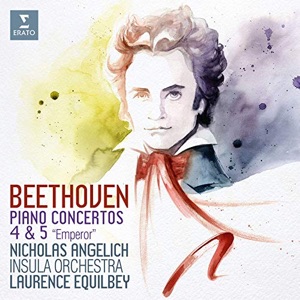No need to waste much time here. The Insula Orchestra is yet another one of those faceless period performance groups whose conductor, Laurence Equilbey, seems to believe that the timbre of the instruments legitimately substitutes for interpretive insight. These are sensibly paced, well-intentioned performances whose chief virtue, orchestrally, is that everyone stays in tune. The use of period instruments offers no additional clarity (bass lines in the Fourth concerto are especially murky), no startling revelations of color–in short, nothing special.
As for Nicholas Angelich, his playing is at one with the ensemble: neat, precise, but otherwise completely unremarkable. His approach to dynamics is sort of terraced: mostly loud-ish then soft-ish (true of the orchestra as well). Opportunities for poetry in the slow movements go for nothing. That of the Fourth concerto is a complete non-happening. The result is a chronic lack of tension, of drama, in other words, of the spirit of Beethoven. There are just too many great recordings of this music to waste your time with these uninspired run-throughs.
































